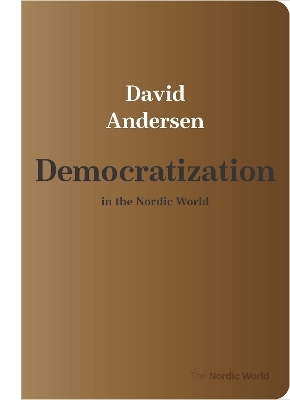
Democratization in the Nordic World
Seiten
2024
University of Wisconsin Press (Verlag)
978-0-299-34594-5 (ISBN)
University of Wisconsin Press (Verlag)
978-0-299-34594-5 (ISBN)
Presents a syncretic history of political and socioeconomic developments in the three Scandinavian countries since the early modern period, and contrasts their peaceful transitions with the more dramatic histories of otherwise similar European countries, like France and Germany.
Denmark, Norway, and Sweden enjoy some of the happiest populations and highest standards of living in the world, thanks in part to stable, democratic systems of government. Here, David Delfs Erbo Andersen presents a syncretic history of political and socioeconomic developments in the three Scandinavian countries since the early modern period, and contrasts their peaceful transitions with the more dramatic histories of otherwise similar European countries, like France and Germany. Unlike these and many other countries—the United States among them—Scandinavia’s transition to democracy from monarchy was not marked by major violent upheavals or extreme political antagonism.
Rather, Scandinavia’s peaceful process of democratization owed itself to the development of a penetrative bureaucracy in the early modern period and the activism of cooperative associations, first of farmers in the early nineteenth century and then of industrialized workers in the late nineteenth and early twentieth centuries. Thanks to the gradual, relatively consensual adoption of political reforms and social norms, the history of “Nordic democratic exceptionalism” today helps account for the ongoing stability of the Scandinavian countries.
Denmark, Norway, and Sweden enjoy some of the happiest populations and highest standards of living in the world, thanks in part to stable, democratic systems of government. Here, David Delfs Erbo Andersen presents a syncretic history of political and socioeconomic developments in the three Scandinavian countries since the early modern period, and contrasts their peaceful transitions with the more dramatic histories of otherwise similar European countries, like France and Germany. Unlike these and many other countries—the United States among them—Scandinavia’s transition to democracy from monarchy was not marked by major violent upheavals or extreme political antagonism.
Rather, Scandinavia’s peaceful process of democratization owed itself to the development of a penetrative bureaucracy in the early modern period and the activism of cooperative associations, first of farmers in the early nineteenth century and then of industrialized workers in the late nineteenth and early twentieth centuries. Thanks to the gradual, relatively consensual adoption of political reforms and social norms, the history of “Nordic democratic exceptionalism” today helps account for the ongoing stability of the Scandinavian countries.
David Delfs Erbo Andersen is an associate professor in the Department of Political Science at Aarhus University. His work has appeared in American Political Science Review, British Journal of Political Science, Democratization, Comparative Politics, Social Science History, and European Journal of Political Research.
| Erscheinungsdatum | 02.10.2024 |
|---|---|
| Reihe/Serie | Nordic World |
| Verlagsort | Wisconsin |
| Sprache | englisch |
| Maße | 146 x 200 mm |
| Themenwelt | Geisteswissenschaften ► Geschichte ► Regional- / Ländergeschichte |
| Sozialwissenschaften ► Politik / Verwaltung ► Politische Systeme | |
| Sozialwissenschaften ► Politik / Verwaltung ► Politische Theorie | |
| ISBN-10 | 0-299-34594-7 / 0299345947 |
| ISBN-13 | 978-0-299-34594-5 / 9780299345945 |
| Zustand | Neuware |
| Haben Sie eine Frage zum Produkt? |
Mehr entdecken
aus dem Bereich
aus dem Bereich
Erinnerungen
Buch | Softcover (2024)
Pantheon (Verlag)
16,00 €
Universalgelehrter, Polarreisender, Entdecker
Buch | Hardcover (2024)
mareverlag
28,00 €


